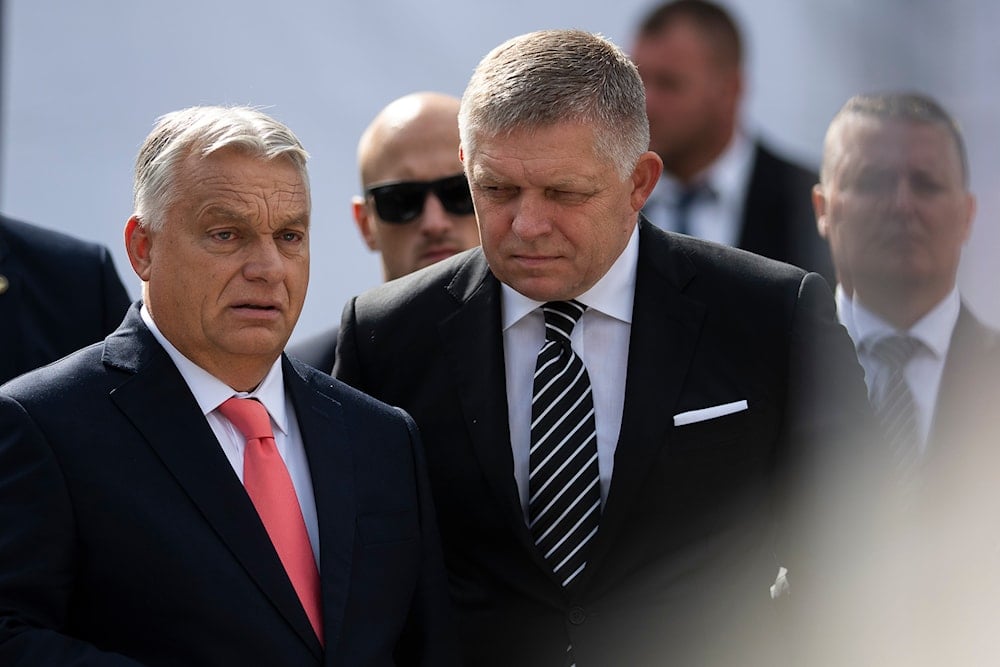Slovakia, Hungary could form EU bloc opposing support for Ukraine
Slovakia may join Hungary in forming an EU bloc opposing further Ukraine support, as officials criticize the West’s anti-Russia stance.
-

Hungary's Prime Minister Viktor Orban and his Slovakian counterpart Robert Fico talk before delivering speeches during the 130th anniversary celebration of Mária Valeria Bridge in Esztergom, Hungary, on Sunday, Sept. 28, 2025 (AP)
Slovakia might support Hungary's proposal for forming an EU bloc that would oppose the continued support for Ukraine, according to Luboš Blaha, the deputy chairman of Slovak Prime Minister Robert Fico’s Smer Party.
Fico previously warned that Europe's "anti-Russia military hysteria" could lead the world into ruin, stating that Russia cannot be defeated without triggering a nuclear war.
In an interview for Izvestia on Saturday, Blaha stated that "joint actions by those who still have a sound mind in Europe are not only possible, but also probable" and argued that the continent is "once again… gripped by a collective madness that is leading us all to war, decline and chaos."
These remarks from Blaha follow earlier comments made this week by a senior advisor to Hungarian Prime Minister Viktor Orban, who told Politico that Hungary, Slovakia, and the Czech Republic could coordinate their positions ahead of EU Council meetings, saying that a “Ukraine-skeptic alliance will come and be more and more visible.”
Hungary, Slovakia dissent against anti-Russian European policies
Both Hungary and Slovakia have refused to provide military aid to Kiev’s regime while urging peace talks instead and maintaining ties with Moscow. Meanwhile, the Czech Republic may join this emerging bloc, since former Prime Minister Andrej Babiš’s ANO party, which won last month’s parliamentary elections, has expressed similar views.
Blaha, whose party is part of Slovakia’s ruling coalition, accused Brussels of pursuing policies that are harmful and run counter to European interests, stating that Bratislava, Budapest, and Prague have a necessity to defend themselves collectively.
Commenting on the idea of a Slovak-Hungarian-Czech alliance, Russian Foreign Ministry spokeswoman Maria Zakharova stated that Moscow would welcome any sensible initiative aimed at a diplomatic resolution to the Ukraine conflict, especially in light of what she described as the West's prevailing Russophobia.
Slovakia, Hungary confront the EU over Ukraine
Slovakia has shifted sharply away from European support for Ukraine, with Prime Minister Robert Fico announcing on March 1, 2025, that the country will halt both military and financial aid to Kiev. Bratislava stressed that EU sanctions on Russia and ongoing support for Ukraine were imposing heavy economic and energy burdens on Central Europe, calling instead for a reassessment of Europe’s energy and economic priorities.
Hungary has similarly taken a confrontational stance within the EU. Budapest blocked proposals to use frozen Russian assets to fund military aid for Ukraine, signaling its opposition to EU-backed military assistance and asserting that Hungarian national interests, particularly energy security, must take precedence. Hungary’s veto-style actions have complicated EU plans to accelerate financial and military support for Kiev.
Earlier, in July 2024, Hungary formally proposed that the EU pursue direct negotiations with Russia to secure a ceasefire, bypassing the bloc’s coordinated approach. The European Council rejected this initiative, affirming that Hungary could not represent the Union internationally. Together, these events show Hungary and Slovakia acting as obstacles to a unified European position on Ukraine, emphasizing national sovereignty and pragmatic engagement with Moscow over collective EU policy.

 3 Min Read
3 Min Read









